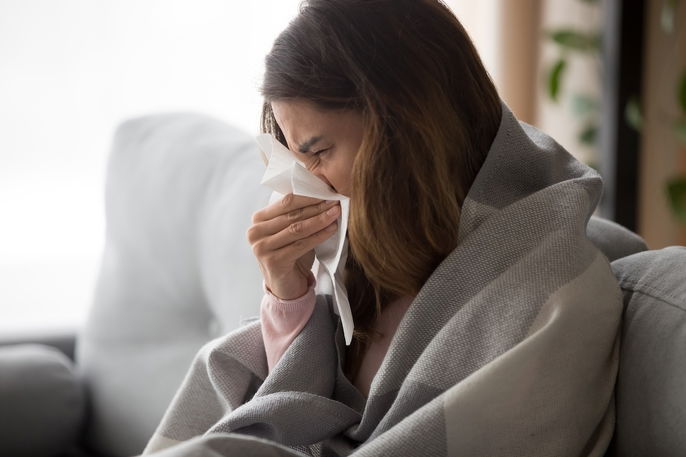Influenza A is one of the main types of the flu virus that appears every year during flu season. It s caused by two variants of the Influenza A virus: H1N1 and H3N2. Both variants cause similar symptoms and can be treated using similarly approaches.
Influenza A tends to develop very aggressively if not treated properly. This is why it is very important to consult a doctor if you suspect you may have influenza A. It can lead to serious complications, such as respiratory distress, pneumonia, respiratory failure or even death.
Rest and adequate fluid intake are essential for treatment, however this infection can also be treated with antiviral drugs to help combat the virus, as well as anti-inflammatories or analgesics to help relieve symptoms.

Main symptoms
The main symptoms of influenza A are:
- Fever above 38 ºC (or 100.4ºF) that appears suddenly
- Muscle aches
- Sore throat
- Headache
- Cough
- Sneezing
- Chills
- Shortness of breath
- Fatigue
In addition to these symptoms, diarrhea and vomiting may also occur. These are especially common in children and resolve on their own.
How do you know if it is influenza A?
Although the symptoms of influenza A are very similar to those of the common flu, they tend to be more aggressive and intense. This infection often requires bed rest for a few days, and the onset of symptoms is typically very sudden.
In addition, influenza A is highly contagious, making it very easy to transmit to other people with whom you have been in contact with. If you suspect you may have the flu, you are advised wear a mask and go to the doctor for testing to confirm the presence of the virus.
What is the difference between H1N1 and H3N2?
H1N1 or H3N2 are two different variants of the influenza A virus, however, their symptoms, treatment and form of transmission are similar. These two types of viruses are present in the flu vaccine, along with Influenza B, and therefore, those who get the flu vaccination every year are protected against these viruses.
However, the H3N2 virus is often confused with H2N3, another type of virus that does not affect humans, and is only transmitted between animals. In fact, there is no vaccine or treatment against the H2N3 virus, as this virus does not affect humans.
Treatment options
Treatment for influenza A usually involves rest, hydration and over-the-counter medications to help relieve symptoms, like acetaminophen, ibuprofen or a cough syrup. These can be taken to reduce fever and worsening of a sore throat, cough and muscle aches.
Moderate to severe cases can be treated with antiviral drugs like oseltamivir or zanamivir. These are generally most effective when started within the first 48 hours of symptom onset.
Medical treatment can also be complemented with natural remedies, such as ginger syrup, for example, which has analgesic, anti-inflammatory and expectorant properties. Check-out other homemade cough syrups that you can prepare to help treat coughs and other symptoms.
In cases where the the flu infection does not improve and starts to worsen, hospitalization may be necessary for IV medications and oxygen therapy. This is especially needed for those who develop breathing difficulties and enter respiratory distress.
When to get the flu vaccine
To avoid catching influenza A, you can get the flu vaccine on a yearly basis. It can help protect the body from the most common influenza viruses, such as H1N1, H3N2 and Influenza B. This vaccine is especially recommended for high-risk groups that are more likely to catch the flu, such as:
- Older adults over 65 years of age
- People with compromised immune systems, such as those with AIDS or myasthenia gravis
- People with chronic diseases, such as diabetes, liver disease, heart disease or asthma
- Children under 2 years of age
- Pregnant women, as they cannot take medication
Ideally, the vaccine should be taken every year to ensure effective protection, as new mutations of the flu virus emerge every year.
Prevention measures
To avoid catching influenza A, there are some measures that can help prevent infection, such as avoiding closed spaces or crowded areas. You should wash your hands regularly, always covering your nose and mouth when coughing or sneezing, and avoid contact with people who have flu symptoms.






























